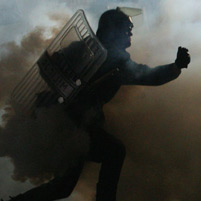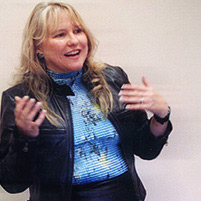Predicting Change


CMU's Kathleen M. Carley
News breaks of an insurgency in an area of conflict. Unknown players emerge as leaders.
The U.S. government must answer key questions about these individuals as quickly as possible. Enter Kathleen M. Carley.
The Carnegie Mellon University professor combines computer science and network analysis to predict group behavior over time.
She's called on to analyze evolving societies, organizations, terrorist networks, drug networks, even a government's readiness to respond to a pandemic or nuclear threat.
"A revolution will break out in a country, and I might get a call from somebody who will say, 'How fast can you tell me who the key actors are, what influences them, and what their concerns are?'" Carley explained.
In the past, this kind of analysis would have taken many years. Today, Carley's team can do it in less than a month.
"We look at the fringe and try to find who's influencing and working with whom and why. This is a type of social forensics. Most people do this, but they forget that space and time are critical, so they may decide that the major actor in a group is someone who is dead or who has left the organization," she said.
"What makes our network analysis special is we look at the social networks as they move through space and time. The context is always changing."
At the moment, her team is assessing the situations in Sudan and Northern Africa. For example, will the referendum hold in Sudan? Which regimes in North Africa will turn to democracy? Will the revolutions spread beyond Tehran, Egypt, Bahrain and Libya?
Inspired by science fiction and using tools they created, including text mining, network analysis and simulations, Carley and her (CASOS) group — CMU's Center for Computational Analysis of Social and Organizational Systems — are, in essence, trying to predict and change how groups will evolve.
"An individual is not predictable, but groups are," Carley said.
"We try to take the general things we know about people and the way groups operate, and then we pull in tons and tons of data from websites, news media, the census," she added.
"We put it in the simulation and do our best to predict what will happen. We convert general social findings, like the tendency of friends to be similar, to mathematical equations and algorithms and use them to forecast social behavior."
Recently, a public health organization made important changes to its operation when Carley's team found it was not adequately prepared for the demands of a pandemic.
"We relate people to ideas, people to activities, people to locations, and put the whole social network in context," Carley said. "That's what we do that is very, very different from what everyone else does."
Carter Butts (HS'02) was one of Carley's advisees.
In fact, he came to CMU specifically to join her CASOS lab, saying it was the only one of its kind.
"I was interested in social networks, decision making, and mathematical sociology, and her group was widely recognized to be at the forefront of the field."
Butts, who is now a professor himself, says Carley was a tremendous mentor.
"Unquestionably, the way in which I think about organizations and organizational processes builds on many of her ideas. Her influence continues to be visible in both my teaching and research," he said.
"It takes a tremendous effort to run a research group like she did — and does. That work doesn't always show up on your CV, but it's that work that produces the next generation of scientists."
Recent News Articles:
- "Death of Osama bin Laden expected to have little effect on al-Qaida, experts say" (Pittsburgh Post-Gazette)
- "Web of War" (Nature), describing how the Pentagon is using computational social science to analyze wars
Related Links: Carley's Bio | CASOS | School of Computer Science
